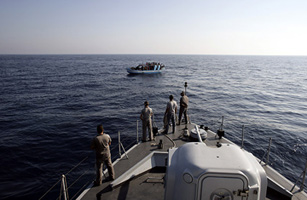
Italian customs police approach a boat loaded with illegal immigrants off the island of Lampedusa
(2 of 2)
Yet such policies address only part of the challenge, and ignore the fact that immigrants now play a huge role in the Italian economy. Italians don't like to think they're racist, but it would be hard to find a dark-skinned resident who agrees. In many ways the country needs to shift its efforts from keeping immigrants out to finding a way to fit them in. "We're creating a group of people who are heavily marginalized and will react the way that marginalized people react," says Sciortino.
Take the official response to the violence in Rosarno, which was sadly familiar. Italian Interior Minister Roberto Maroni, a prominent Northern League politician, blamed it on his country's lax approach to undocumented workers. "For years illegal immigration — which feeds criminal activities — has been tolerated and nothing effective has ever been done about it," he said. Never mind that the IOM estimates that at least half of the evacuated workers now detained in reception centers held regular working papers. When activist groups announced that the country's migrants might strike on March 1, Maroni responded that any illegal aliens found in the piazzas that day would be arrested and expelled.
There's another way. Domenico Lucano, mayor of Riace, a hilltop village 37 miles (60 km) east of Rosarno on the other side of the rugged mountains, offered to take in the most wounded migrants. "What happened in Rosarno left us without words," he says. "A piece of paper can't make the difference between being a man or not."
Riace — a cluster of tiled-roof buildings overlooking the Ionian Sea — has spent the past decade actively seeking out immigrants in an attempt to revitalize itself. Ten years ago, the small village in one of the poorest parts of the country was rapidly depopulating. Houses stood empty. Businesses struggled to survive. "Riace was dying," says Antonio Chillino, a town butcher. "The young were leaving. We started to ask, What now? Do we close and relocate somewhere else?"
It was then that Lucano — elected mayor in 2004 — began recruiting new residents, taking advantage of a government integration program to bring in refugees who had passed through Italy's detention system. "A place of homes without inhabitants met a group of people without houses," he says. Riace is now home to more than 40 immigrants and their families, and last month along with two neighboring communities, the town began accepting 180 Palestinians from a camp on the Syria-Iraq border. "People here understand that the refugees can be a resource, and not a menace," says Cosimo Curiale, who runs the village's immigration program. "With the arrival of the immigrants came children, and they saved the schools. Teachers are hired. The butchers work more. The grocer works more. The tobacco shop works more."
Unfortunately, Riace remains the exception. And while the town's cobblestone walkways may ring with the shouts of children, Lucano's project is far from sustainable. It relies on government funding to provide its new residents with a livelihood. Victims of this month's violence have also begun to arrive ("If I can find work, I will stay," says one), but the town is unlikely to take in more than half a dozen or receive funding to maintain them. Meanwhile, the old olive-oil factory in Rosarno where several hundred immigrants once squatted has been abandoned. Dark smears just outside the gates mark the spots where fires burned. Inside the buildings, clothes hang across machinery. A pair of chickens scratch between tents on the concrete floor. There are signs of a community — chairs set up as if for a meeting. One room looks like it served as a church; hand-inked posters praising Jesus adorn the wall.
In the nearby orchards, immigrants from North Africa and Eastern Europe pick fruit under much the same conditions as the people they replaced. And, says Despina Ivasenco, a Rosarno-based immigrant advocate, some of the original African laborers have already returned. "The orange harvest continues," she says. With roughly a quarter of Italy's GDP coming from the informal sector, irregular migration is nearly impossible to control. "It's very difficult to crack down on illegal immigrants because it means cracking down on one of the key structures of the Italian economy," says Sciortino.